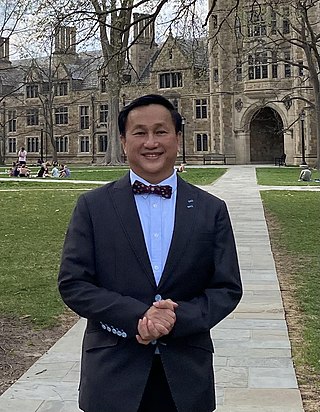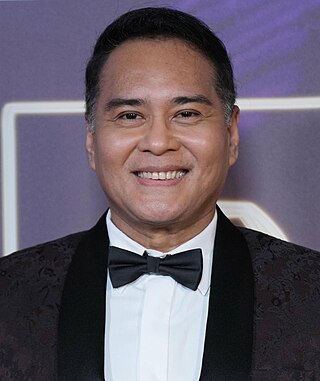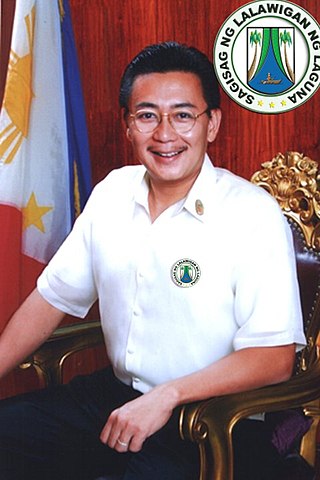Related Research Articles

Quezon City, also known as the City of Quezon and Q.C., is the most populous city in the Philippines. According to the 2020 census, it has a population of 2,960,048 people. It was founded on October 12, 1939, and was named after Manuel L. Quezon, the second president of the Philippines.

Nora Cabaltera Villamayor, known professionally as Nora Aunor, is a Filipino actress, recording artist, and film producer. Aunor has also appeared in several stage plays, television shows and concerts. She is known as Philippine cinema's "Superstar" and was conferred as a National Artist of the Philippines for Film and Broadcast Arts in 2022. The Hollywood Reporter called her "The Grand Dame of Philippine Cinema" for her performances in the movies Taklub (Trap) and Hustisya (Justice), and for her contributions to the Philippine film industry.

Cesar Demontaño Manhilot, known professionally as Cesar Montano, is a Filipino actor, film producer, film director and aspiring politician.

The Cinema of the Philippines began with the introduction of the first moving pictures to the country on August 31, 1897, at the Salón de Pertierra in Manila. The following year, local scenes were shot on film for the first time by a Spaniard, Antonio Ramos, using the Lumiere Cinematograph. While most early filmmakers and producers in the country were mostly wealthy enterprising foreigners and expatriates, on September 12, 1919, Dalagang Bukid , a movie based on a popular musical play, was the first movie made and shown by Filipino filmmaker José Nepomuceno. Dubbed as the "Father of Philippine Cinema," his work marked the start of cinema as an art form in the Philippines.

Raymundo Cipriano Pujante Cayabyab, known professionally as Ryan Cayabyab, is a Filipino musician, composer and conductor regarded as one of the pillars and icons of Original Pilipino Music (OPM). He was the Executive and Artistic Director for several years for the defunct San Miguel Foundation for the Performing Arts. He was named National Artist of the Philippines for Music in 2018.

The Cultural Center of the Philippines Foundation, Inc. is a government-owned and controlled corporation established to preserve, develop and promote arts and culture in the Philippines. The CCP was established through Executive Order No. 30 s. 1966 by President Ferdinand Marcos. Although an independent institution of the Philippine government, it receives an annual subsidy and is placed under the National Commission for Culture and the Arts for purposes of policy coordination. The CCP is headed by an 11-member Board of Trustees, currently headed by Chairperson Margarita Moran-Floirendo. Its current president is Arsenio Lizaso.

The Metro Manila Film Festival (MMFF) is an annual film festival organized by the Metro Manila Development Authority and held nationwide in the Philippines. The festival, which runs from Christmas Day through New Year's Day and into first weekend of January in the following year, focuses on Filipino produced films. During the course of the festival, movie theaters show only films that are approved by its jurors and exclude foreign films except in 3D theaters and IMAX theaters. It is one of the two Filipino major film festivals to exclude foreign films in a week-long period, the other being the Pista ng Pelikulang Pilipino happening during August.

The Oblation Run is an annual event held by the University of the Philippines (UP) and Polytechnic University of the Philippines (PUP) chapters of Alpha Phi Omega (APO) on the PUP and different UP campuses. The runners are male, and traditionally run completely naked in public places, with their genitals fully visible, on a designated route. The event was first organized in 1977 at the University of the Philippines Diliman to promote Hubad na Bayani, a film. It draws its name from the Oblation, a statue of a nude man located in every University of the Philippines campus, which symbolizes "a selfless offering of one's self to the country." The event is usually done on December 16, and serves as a protest to contemporary national issues.

GMA Network Films, Inc., doing business as GMA Pictures, is a Filipino film and television production company headquartered in Quezon City. It is one of the major film production companies in the Philippines, along with Star Cinema, Regal Entertainment and Viva Films. Its films include Jose Rizal (1998), Muro Ami (1999), and Deathrow (2000).

Francis Ng Tolentino is a Filipino politician and lawyer. He has served as a Senator since 2019.

Antonio de Jesus Villegas was a Filipino politician who served as the 18th Mayor of Manila from 1962 to 1971. His term was after the term of Arsenio Lacson as mayor of Manila, and before the period of martial law in the Philippines.

The 38th Metro Manila Film Festival (MMFF) is a part of the annual film festival in Metro Manila, Philippines held from December 25, 2012 until January 8, 2013. During the festival, no foreign films are shown in Philippine theaters in order to showcase locally produced films.

Romeo Gonzales Arcilla, known professionally as John Arcilla, is a Filipino multi-awarded actor and environmentalist. Arcilla won Best Actor awards at the 78th Venice International Film Festival and the Gawad Urian Awards for his performance in On the Job: The Missing 8. He is the first Filipino and Southeast Asian to win the Volpi Cup for Best Actor. He played the role of Antonio Luna in the historical drama film Heneral Luna, Hagorn in the fantasy drama television series Encantadia, and Renato Hipolito in the action drama television series FPJ's Ang Probinsyano.
Gatpuno Antonio J. Villegas Cultural Award is an annual event created by the Metro Manila Film Festival in honor of former mayor (gatpuno) Antonio Villegas. It awards lifetime achievement awards to films in the annual film festivals, and that portrays Philippine culture and Filipino people to the world.

Emilio Ramon Pelayo Ejercito III, commonly known as E. R. Ejercito, is a Filipino actor and former governor of Laguna from 2010 until his removal in 2014. Prior to his election as governor, he served as mayor of Pagsanjan, Laguna, from 2001 until 2010. He is the son of actor George Estregan and the nephew of former President and former Manila Mayor Joseph Estrada.

The 2016 Metro Manila Film Festival (MMFF) is the 42nd edition of the annual Metro Manila Film Festival held in Metro Manila and throughout the Philippines. It is organized by the Metropolitan Manila Development Authority (MMDA). This is the first time that the festival committee required producers to submit either picture lock versions or finished films, instead of screenplays in previous editions. During the festival, no foreign films are shown in Philippine theaters (except IMAX, 4D, and large format 3D theaters), however there are some non-MMFF entries like The Super Parental Guardians, and Enteng Kabisote 10 and the Abangers shown on SM Cinema branches.
The 2017 Metro Manila Film Festival (MMFF) is the 43rd edition of the annual Metro Manila Film Festival held in Metro Manila and throughout the Philippines. It is organized by the Metropolitan Manila Development Authority (MMDA). During the festival, no foreign films are shown in Philippine theaters (except IMAX, 4D, and large format 3D theaters).
The 2018 Metro Manila Film Festival (MMFF) is the 44th edition of the annual Metro Manila Film Festival held in Metro Manila and throughout the Philippines. It is organized by the Metropolitan Manila Development Authority (MMDA). During the festival, no foreign films are shown in Philippine theaters (except IMAX and 4D theaters).
The Summer Metro Manila Film Festival is a film festival intended to be held annually in Metro Manila, Philippines. The event is a spin-off of the Metro Manila Film Festival which is officially held every December. Like its sister festival, it excludes foreign films and only shows shortlisted entries in digital theaters except IMAX and 4D theaters.
The 2020 Metro Manila Film Festival (MMFF) is the 46th edition of the annual Metro Manila Film Festival. It is organized by the Metropolitan Manila Development Authority (MMDA). It is the first edition of the festival to be held online due to the COVID-19 pandemic, and also the first to make its entries available to an audience outside the Philippines as part of the festival's official run.
References
- ↑ "Subsidize movie industry – Lito Atienza". February 4, 2010. Archived from the original on November 29, 2011. Retrieved January 10, 2012.
- ↑ Mata, Paul (December 21, 2018). "The Metro Manila Film Festival: A Filipino yuletide tradition". PEP.ph. Retrieved December 25, 2018.
- ↑ "2 romances, a horror flick, and a family drama make up the final four MMFF entries". BusinessWorld. October 12, 2018. Retrieved December 25, 2018.
- ↑ Arevalo, Ike (June 21, 1992). "The Mother of All Filmfests". Sunday Standard . Philippine Manila Standard Publishing. pp. 7–10. Retrieved April 16, 2023– via Google News.